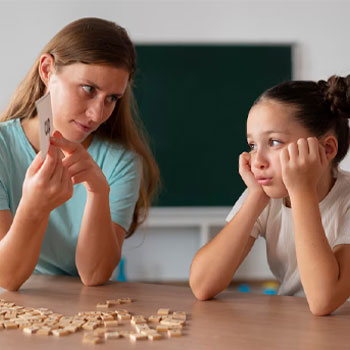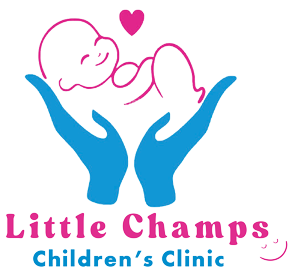Understanding and managing ADHD in children: A guide from Little Champs Children's Clinic
Attention-Deficit/Hyperactivity Disorder (ADHD) affects many children and adolescents, impacting their attention span, self-control, and overall behavior. While these symptoms can challenge daily activities and academic progress, the right support and strategies can make a profound difference in a child’s quality of life. At Little Champs, we offer a compassionate, expert-driven approach to assessing and managing ADHD, helping children and families navigate these challenges effectively.
What is ADHD and how does it affect children?
ADHD is a neurodevelopmental disorder that manifests in early childhood, often as difficulty maintaining attention, controlling impulsive behavior, or regulating physical energy. The exact cause of ADHD isn’t fully understood, but genetic, neurological, and environmental factors are thought to play a role.

Children with ADHD may find it hard to focus on tasks, complete school assignments, or even participate fully in social interactions. It’s not unusual for their symptoms to vary widely, and each child’s experience with ADHD is unique.
What are the symptoms of ADHD in children?
- Inattention: children with ADHD may be easily distracted, have trouble listening to instructions, or appear forgetful in daily activities.
- Hyperactivity: they may exhibit excessive fidgeting, inability to sit still, or feel the need to talk constantly.
- Impulsivity: this can show up as interrupting conversations, difficulty waiting for turns, or acting without considering the consequences.
For parents, teachers, and caregivers, it can be challenging to distinguish between normal childhood behavior and symptoms of ADHD. That’s why a professional assessment is crucial in making an accurate diagnosis.
What are the causes and risk factors?
ADHD is a complex condition without a single, identifiable cause. Research shows that ADHD develops due to a combination of genetic, neurological, and environmental factors, each contributing to its presence and varying symptoms in children and adolescents. Understanding the potential causes and risk factors can help families recognize symptoms early and seek timely support.
Genetic factors
ADHD often runs in families, and genes are believed to play a significant role. Children with close relatives who have ADHD are more likely to develop it themselves. Studies suggest that specific genetic markers may impact brain chemicals, such as dopamine, which is responsible for regulating attention, motivation, and behavior. These genetic influences make certain children more predisposed to hyperactivity disorder.
Brain structure and function
Differences in brain structure and function have been linked to ADHD. Brain imaging studies reveal that some children with ADHD have altered brain activity in regions associated with attention, impulse control, and executive function. These variations may affect how the brain processes information and handles distractions, making it difficult for children to focus and control impulses.
Prenatal and early life influences
Certain factors during pregnancy and early childhood may increase the risk of ADHD. These include:
- Maternal smoking and alcohol use: exposure to substances like nicotine, alcohol, and other drugs during pregnancy can interfere with fetal brain development, increasing the risk of ADHD in children.
- Premature birth and low birth weight: babies born prematurely or with low birth weight have a higher likelihood of developing ADHD. Premature birth can affect brain development, potentially leading to behavioral challenges as children grow.
- Environmental toxins: exposure to toxins, such as lead or pesticides, particularly in early childhood, can negatively affect brain development, raising the risk of ADHD.
Environmental factors and lifestyle
While environmental influences are not direct causes of ADHD, they can impact symptom severity and manageability. Factors such as high levels of stress at home, lack of structure, or limited access to educational resources may exacerbate symptoms for children predisposed to ADHD. Diet, sleep, and activity levels can also play a role in how ADHD symptoms are expressed. Ensuring a balanced diet, adequate sleep, and opportunities for physical activity can help children manage symptoms more effectively.
Family and social environment
Children’s social environments, including family dynamics and school experiences, can influence the symptoms. While family situations like stress, conflict, or a lack of routine don’t directly cause ADHD, they may intensify symptoms in children who already have the disorder. Supportive family structures and positive social interactions, on the other hand, can help children better cope with and manage their symptoms.
Understanding ADHD’s complex nature
ADHD is a multifactorial condition, meaning that several overlapping factors can contribute to its onset. While no single cause can explain this, understanding these genetic, biological, and environmental influences helps to shed light on why some children are more prone to symptoms. If this disorder runs in your family, or if you recognize symptoms, early evaluation and professional support can make a significant difference in managing ADHD effectively.
ADHD Services at Little Champs Children's Clinic
At Little Champs, we understand the complexities of this disorder and are dedicated to providing a range of services that are both comprehensive and supportive for children and their families. Our goal is to create a customized, flexible treatment plan that addresses the unique needs of each child.
Screening and comprehensive diagnostic assessments
Identifying ADHD is the first step towards effective management. Our screenings and assessments involve a detailed history and observation process, which includes input from parents, teachers, and caregivers. We use research-backed assessment tools that provide a thorough understanding of your child’s behavior, strengths, and challenges. This in-depth analysis helps ensure that a diagnosis is both accurate and tailored to the child’s profile.
Personalized treatment and behavior therapy plans
Once we have a diagnosis, our pediatricians in vijayawada develop an individualized treatment plan designed to address your child’s specific needs. Behavior therapy is often one of the most effective strategies for managing this disorder. This may include positive reinforcement, skill-building activities, and techniques to improve self-regulation and focus. We work closely with families to create home and school strategies that empower both parents and children to manage symptoms more effectively.
Medication options and ongoing management
Medication can be a helpful part of the treatment plan, but it’s not always necessary for every child. At Little Champs, our experienced pediatric specialists in vijayawada evaluate each case to determine the most effective approach. When medication is recommended, we start with safe, low doses and continuously monitor your child’s progress. Our approach ensures that any medication prescribed is carefully balanced to manage symptoms while minimizing side effects. We also maintain regular follow-ups to adjust treatment as your child grows and their needs evolve.
Parental support and family guidance
At our children's clinic in vijayawada, we know that parenting a child with ADHD comes with unique challenges. We provide ongoing guidance and support for families, offering tools and resources that help you create a nurturing and structured home environment. Our pediatric doctors in vijayawada also work with school staff, when possible, to develop strategies that promote a successful learning experience. We believe in a collaborative approach that includes family and school support, ensuring that children with ADHD have a consistent and positive environment for growth.
What are the best ADHD tips and techniques for parents?
In addition to medical and therapeutic support, here are some practical strategies that can help manage ADHD symptoms at home:
- Establish routines: children with ADHD benefit from structured daily routines that provide a sense of order and predictability.
- Use positive reinforcement: rewarding desired behaviors can be a highly effective way to encourage focus and discipline.
- Set clear expectations: be clear and consistent with rules and consequences, helping your child understand boundaries.
- Break down tasks: large tasks can feel overwhelming, so breaking them down into manageable steps can help children stay on track.
- Limit distractions: minimizing background noise and setting up a distraction-free study space can improve focus.
Why choose Little Champs Children's Clinic for ADHD care?
At Little Champs, we’re committed to creating a safe, nurturing environment where children with ADHD can thrive. Our experienced children doctors in vijayawada stay updated on the latest ADHD research, and we take a compassionate, individualized approach to each family we work with. With a focus on both medical and behavioral support, we ensure that families receive comprehensive care designed to empower children and give them the skills to overcome everyday challenges.
Our Children's Hospital in vijayawada also emphasizes building strong relationships with parents, schools, and caregivers, providing a well-rounded network of support for each child. We understand that managing ADHD is a journey, and our team of best pediatricians in vijayawada is here to provide guidance, resources, and encouragement every step of the way.
